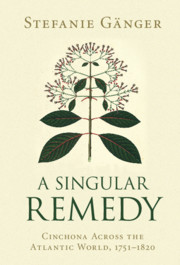‘Building on extensive research in archives and libraries across various continents, A Singular Remedy follows the pathways of how cinchona and the stories and practices associated with it travelled and were shared across epistemic systems, medical traditions, tastes, social divides, and religious beliefs.'
Miruna Achim - Universidad Autónoma Metropolitana, Mexico City
‘Almost half a century ago, the great French historian Emmanuel Le Roy Ladurie alerted us to the ‘microbial unification of the world'. That lesson has been brought home to drastic effect during the 2020 coronavirus pandemic. In her learned and sparkling study of the global career of cinchona, Stefanie Gänger tells a counter-story: the unification of much of the world through a ‘singular' medicinal substance.'
Jürgen Osterhammel - Freiburg Institute for Advanced Studies
‘Gänger follows cinchona down an astonishing range of paths, demonstrating that this was a quintessentially global product of the age of revolutions, but nevertheless keeps the Andes and its forests, peoples and coercive labour regimes in central view. She complicates a global economic history of the bark by recovering the contingent cultural practices that were used to cure an imprecise condition. Admirably nuanced, researched across languages, and beautifully written, this is global history at its best today.'
Sujit Sivasundaram - University of Cambridge
‘One of the most impressive features of the book is the extensive range of archival and secondary sources on which it draws. A Singular Remedy is a welcome addition to the literature. This book is for not just medical historians but anyone interested in the global history of knowledge.’
Linda A. Newson
Source: Hispanic American Historical Review
'Gänger's study examines how medical knowledge was dispersed, shared, and adopted throughout the Atlantic World in the late 18th century and beyond … Specialists in pharmacological history will enjoy reading this, but so will anyone interested in the Atlantic world or the histories of medicine, science, and material culture. Highly recommended.'
J. Rankin
Source: Choice Connect
'Her study is not only an impressive contribution to scholarship on the circulation of medicinal substances, but also an outstanding example of how to integrate material practice and geographical scope into the history of science.'
Anna Simmons
Source: History of Science, Technology, and Medicine
‘a valuable resource for those examining early modern trade, empire, medicine, and ideas from a range of methods or disciplines … Given the success of the approach in A Singular Remedy, the lessons deserve to be applied elsewhere.’
Zachary Dorner
Source: Journal of Interdisciplinary History
‘… this is a valuable text for researchers, especially for graduate students who seek to understand the processes and veins of trade of the Atlantic world. For undergraduates who are curious about how to write a transnational history of science, Gänger provides an excellent example. Finally, environmental historians will also be satisfied with her discussion of environmental degradation and its relationship with the social and labor history of the Indigenous and colonial inhabitants of cinchona’s environs.’
Phoebe Labat
Source: H-Net Reviews
‘… an impressive addition to the historiography on the global circulation of medicinal substances and associated knowledge and practices. By breaking free of individual imperial contexts, Gänger has demonstrated both the commonalities of the experience of cinchona across the Atlantic world while also showing they interacted with local tastes and therapeutic practices. Her work deserves to be closely engaged with by medical historians and scholars of global circulation and trade, and will hopefully prompt further research into the early global history of cinchona as well as inter-regional movement of other medical commodities.’
Katrina Maydom
Source: Journal of the History of Biology



